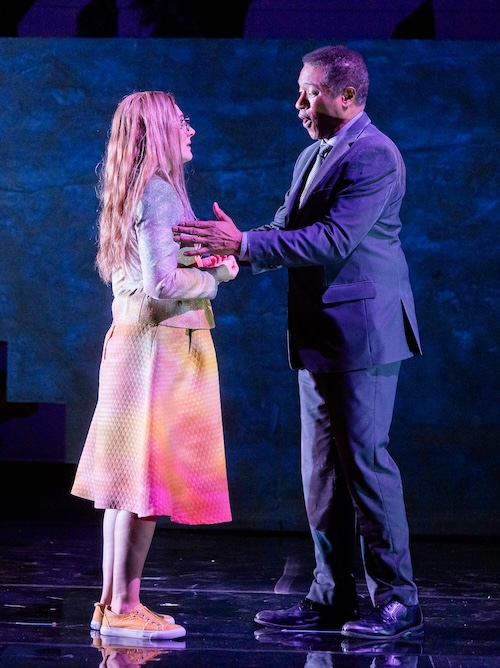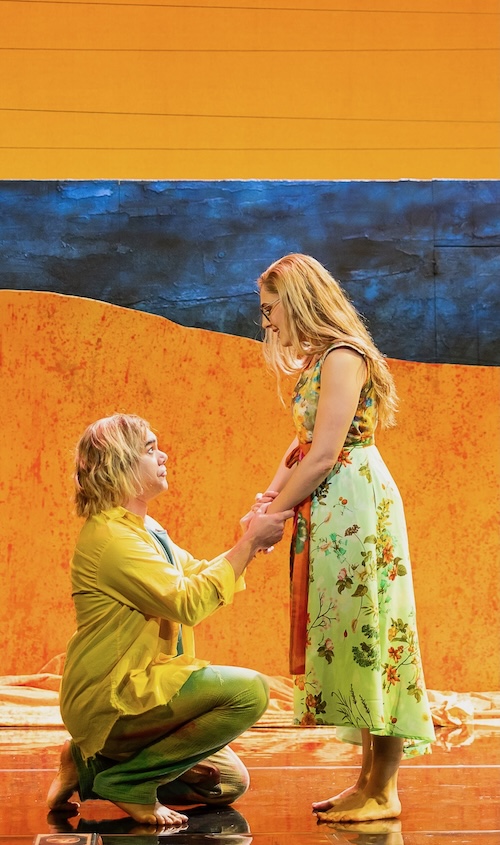Strong cast can’t overcome uneven score in BLO’s “Eurydice”

Sydney Mancasola in the title role and Mark S. Doss as the Father in Matthew Aucoin’s Eurydice at Boston Lyric Opera. Photo: Nile Scott Studios
“I am in hell!” The words belong to Fletcher Christian, but they apply equally well to the characters in Matthew Aucoin’s opera Eurydice, which received its local premiere Friday night at The Huntington Theatre courtesy of Boston Lyric Opera.
First heard in Los Angeles in 2020, Aucoin’s three-act update of the Orpheus myth presents some welcome twists on an old tale. Setting a libretto by Sarah Ruhl that’s based on her eponymous play, the opera’s action is centered around the legendary musician’s doomed wife. Additionally, it introduces a pivotal new figure in the form of Eurydice’s deceased father.
BLO’s production, which follows on Eurydice’s runs at L.A. Opera and the Met, offered a bit of novelty in its own right, introducing a new, reduced orchestration of the score that the company co-commissioned with Opera Grand Rapids.
That fresh instrumentation proved bracing and transparent. And the revised storyline allowed for some new insights, though they didn’t come without hiccups.
Throughout, the original narrative framework is still present: Orpheus and Eurydice wed, she dies on their wedding day, and the heartbroken husband travels to the Underworld to retrieve his wife. Hades agrees to release her on the condition Orpheus doesn’t turn around until they reach Earth. But Orpheus can’t keep his end of the bargain and Eurydice returns to Hades’ domain.
So far, so good. But the introduction of Eurydice’s father to Ruhl’s scenario alters the opera’s dramatic weight at Orpheus’s expense. As a result, he is by far the least developed of Eurydice’s three lead characters. Often brooding and distracted, Orpheus’s love for Eurydice appears genuine, but his importance to this telling of the fable is secondary.
Eurydice’s nameless Father, who Ruhl interpolated into her play after her own father’s death, is Eurydice’s most fully formed. His attempts to communicate with his daughter when she’s among the living set in motion the opera’s plot and his efforts to ease her arrival into Hades’ dominion (including building her a room of string) are touching.
The title character herself is far more fleshed out in Ruhl’s telling than in earlier operatic adaptations like Claudio Monteverdi’s and Christoph Willibald Gluck’s. No helpless waif, she comes across here more as someone done in by circumstances outside her control than anything else. Though what she sees in Orpheus isn’t always evident, her affection for her father is readily apparent.
Balancing out this unlucky trio are a chorus of stones that provide the opera most of its comic relief and Hades, who Aucoin casts as a high tenor.
Strangely, though, the dramatic tone of Eurydice is occasionally unclear. Though it culminates in tragedy, the journey there is unexpectedly discursive.
Surely, for instance, the devastated Father’s soliloquy in which he recalls his childhood before immersing himself in the Styx and erasing his memory isn’t supposed to garner laughs. Yet there were plenty of guffaws and loud chuckles to be heard during his melodrama on Friday. Likewise, virtually all of Hades’ appearances substituted camp for terror.
Though BLO’s staging bears some responsibility for this confusion, Aucoin’s score, while deft, energetic, colorful, and wonderfully fluent, isn’t faultless. Indeed, it can be referential to the point of being derivative: John Adams, Philip Glass, Leonard Bernstein, and Thomas Adès all evidently left their fingerprints on it and, while much of the music (especially in the orchestra) is agreeable to the ear, precious little of it lingers there.
Rather, one spends whole scenes waiting for the plot to proceed and for special moments to arrive and elevate the opera. They come in fits and starts: the murky, sinking figures that lead to the introduction of the Father in Act 1—also the same act’s ominous wedding party music; Eurydice’s time-stopping aria in Act 2; and the tragic, closing part of Act 3, among them.
Would that more of Eurydice was made up of episodes like these: the tale’s dark turns bring out Aucoin’s best writing and he is a supremely talented composer.
In much of Eurydice, though, an overreliance on ostinatos and swirling arpeggios in the orchestra takes on a glib quality. The vocal writing, with somewhat haphazard text settings and a dearth of memorable tunes, doesn’t always compensate. What’s more, Eurydice’s handful of whiplash meta nods – like Hades-in-disguise cuing tunes on the radio – can be downright twee.
Regardless, Friday’s performance, which was led by the composer in the pit, was vividly dispatched by the BLO orchestra. It was also, on the whole, very well cast.
Sydney Mancasola delivered the high-lying title role with aplomb. Singing with silvery tone, even projection, a big dynamic range, and miraculously precise intonation, her Eurydice was wholly sympathetic. In particular, Mancasola imbued her character’s two big arias—the first articulating the challenges of loving an artist and the second a letter to Orpheus’s future wife— with touching pathos.
As the Father, Mark S. Doss was similarly affecting. Especially in his character’s Act 2 interactions with Eurydice, Doss exuded warmth and understanding. His final scene, the audience’s inexplicable tittering aside, was powerfully done.
One of the opera’s striking notions is to have two singers take the role of Orpheus: a baritone for his stage presence and an occasionally offstage countertenor representing his artistic persona. Though Elliot Madore’s account of the former periodically sounded forced, his duets with his double, Nicholas Kelliher, were eerily blended.
David Portillo reveled in the extremes of Aucoin’s writing for Hades while the chorus of stones were sung with winning spirit and clarity by, respectively, Maggie Finnegan, Alexis Peart, and Neal Ferreira.
BLO’s production, which was directed by Douglas Fitch, made good use of the Huntington’s stage. The sets were efficient—a moving wall did at least triple-duty as a high rise, the Gates of Hell, and a staircase to the Underworld—and costumes ran the gamut from beachy attire for Orpheus, Eurydice, and their small wedding party, to the Father’s business suit and Hades’ garish dresses.
While some directorial choices, like Hades’ Rocky Horror Picture Show-goes-to-Versailles motif in Eurydice’s third act, undercut the horror of the moment, other allusions (such as Orpheus’s The Shining-worthy final appearance) were on-point.
Ultimately, this was a staging that, with Jorge Arroyo’s lighting design and Liz Printz’s wigs and makeup, embraced the extremes of the tale’s theatricality. If it didn’t add up to the sum of its parts it at least didn’t land us—like Orpheus, Eurydice, and Fletcher Christian—in the Other Place.
Eurydice will be repeated at 3 p.m. Sunday, 7:30 p.m. March 6th, 7:30 p.m. March 8th, and 3 p.m. March 10th at The Huntington Theatre. blo.org
Posted in Performances

Posted Mar 07, 2024 at 3:36 pm by PeaceBang
I’m sorry, but since when do we expect to come away from a contemporary opera humming memorable tunes!!?